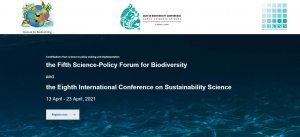
Introduction
The world community is currently in the process of developing an ambitious post-2020 global biodiversity framework to be adopted at the fifteenth meeting of the Conference of the Parties to the Convention on Biological Diversity (COP 15). The framework is intended, inter alia, to accelerate efforts to halt and reverse the global decline of biodiversity, contribute to the 2030 Agenda for Sustainable Development and facilitate the transformational changes needed to place the global community on a path towards realizing the 2050 Vision of Living in Harmony with Nature.
How to realize this vision in practical terms, including mainstreaming biodiversity and fostering transformative change, should be examined by scientists, policymakers and other relevant stakeholders at various levels.
It is also necessary to discuss these issues among other multilateral environmental agreements (including biodiversity-related conventions, UNCCD, UNFCCC and the Paris Agreement) and within the context of the 2030 Agenda for Sustainable Development.
Objectives
The joint fifth Science-Policy Forum for Biodiversity and the eighth International Conference on Sustainability Science (ICSS 8) aim to provide space for scientists, policy makers and other relevant stakeholders to discuss and make recommendations on how science, technology and innovation could contribute to the effective implementation of the post-2020 global biodiversity framework in order to bend the curve of biodiversity loss and obtain positive biodiversity outcomes and foster transformative change towards achieving the 2050 Vision.
In particular, participants will discuss options and solutions to facilitate the implementation of the post-2020 global biodiversity framework, including potential nature-based solutions for tackling both biodiversity loss and climate change challenges based on solid scientific knowledge and evidence. They will also identify key knowledge gaps and priorities for science-policy research, needs for capacity building and opportunities for increased technical and scientific cooperation.
